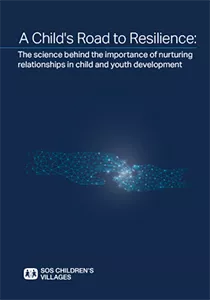New resource: A Child's Road to Resilience
Stable and supportive relationships are essential for nurturing holistic growth in children and young people – emotionally, cognitively and socially. When individuals know they are loved, accepted and supported, they flourish in multiple dimensions: cultivating a secure sense of self-worth, learning to trust in themselves and others, and engaging with the world around them.
This emotional fortress enables children and youth to hone their coping skills and build resilience. The daily hurdles of growing up demand it. When adversity strikes, those with robust support systems can bounce back, adapt, and grow.
Today’s children and youth are coming of age in a world filled with extraordinary challenges – the climate crisis, political instability and war, forced migration, poverty, inflation, youth unemployment, the misuse of social media and artificial intelligence. To name but a few. They will need all the support they can get to grow up strong and transition to independence. Those who experience neglect, abuse or other traumas in childhood need even more support.
A Child's Road to Resilience explores the role that nurturing relationships play in child and youth development. By providing scientific evidence, the aim is to contribute to efforts that support children and youth to build the resilience they need to meet life’s challenges.
The research methodology involved an extensive desk review of peer-reviewed studies and other academic literature. The review covered a range of disciplines, with a particular focus on neuroscience.
Research questions included:
-
Why are nurturing relationships important for a child’s development?
-
What is the role of nurturing relationships in building resilience and mitigating the impact of neglect, abuse and other traumas?
-
Can trauma be passed down through generations?
A Child's Road to Resilience contains four case stories illustrating different resilience-building aspects. This publication brings together existing findings and provides a snapshot of current trends in research and practice. In doing so, it is meant to serve as a general introduction for anyone interested in learning more about how relationships in childhood contribute to child development, healing and beyond. A Child’s Road to Resilience provides insight on the following:
-
The architecture of the brain
-
The role of attachment
-
Responsive interactions
-
The mental health of parents and other caregivers
-
Intergenerational trauma
-
The healing power of secure relationships
-
Building resilience
At SOS Children's Villages, we believe that every child deserves the opportunity to thrive, regardless of their circumstances. By nurturing resilience in children, we empower them to face life's challenges with courage, strength, and optimism. Neuroscience confirms that it is never too late to heal from the past, build resilience and chart a new future and that trusting relationships play a vital role in supporting change.
Together, we can create a world where every child has the support and resources they need to build a brighter future.
A Child's Road to Resilience: The science behind the importance of nurturing relationships in child and youth development

